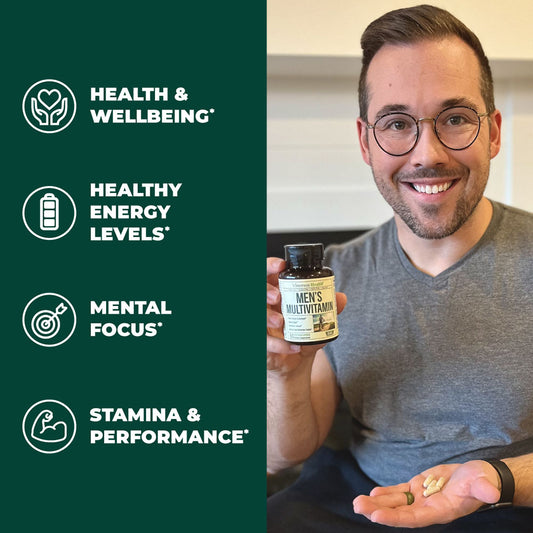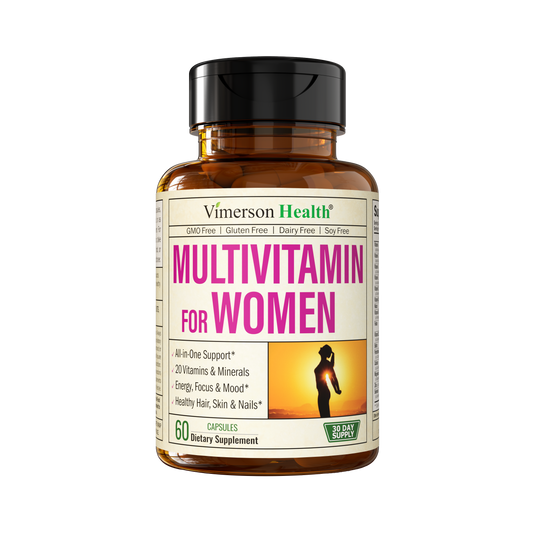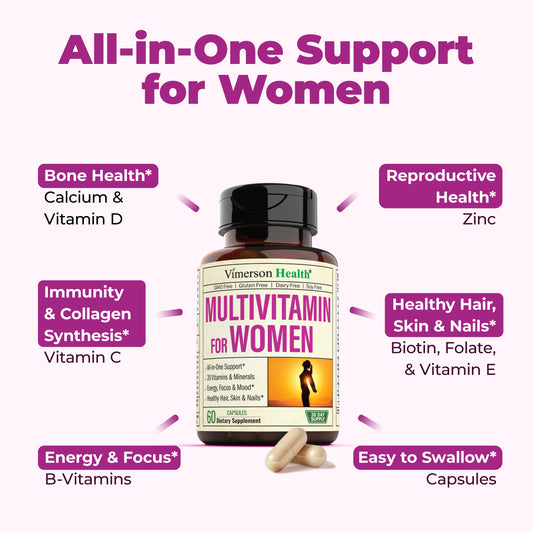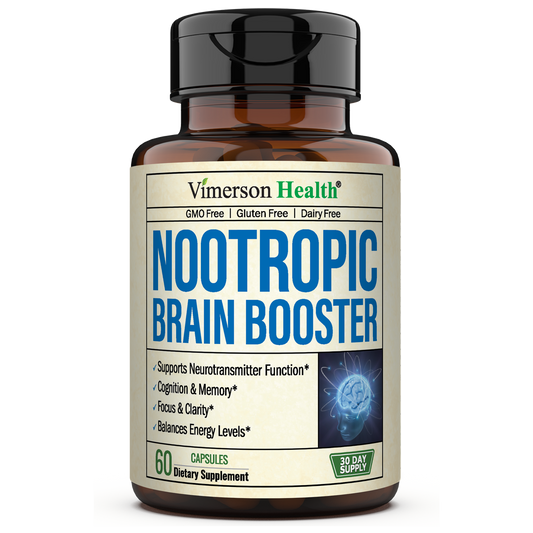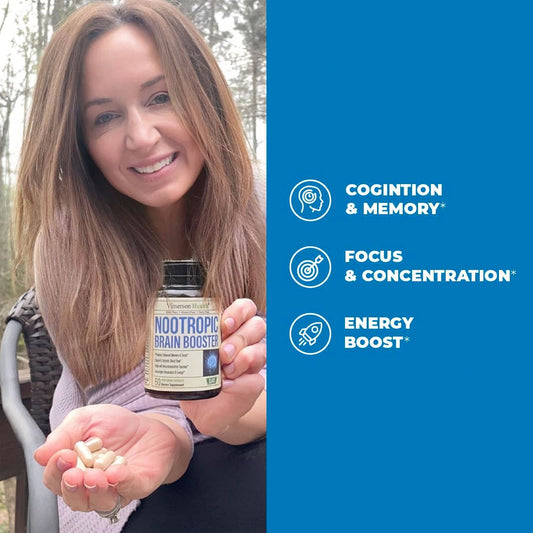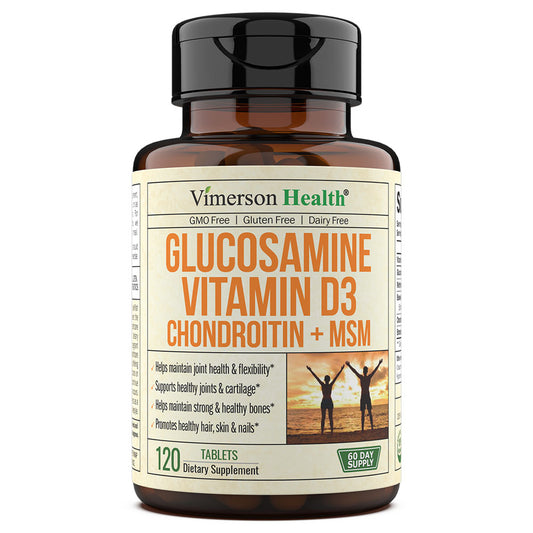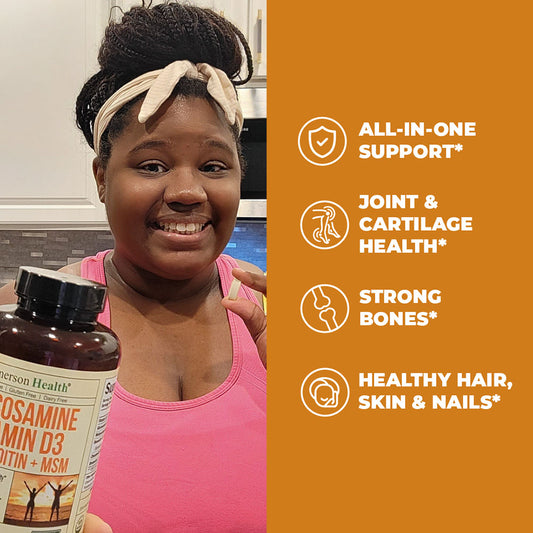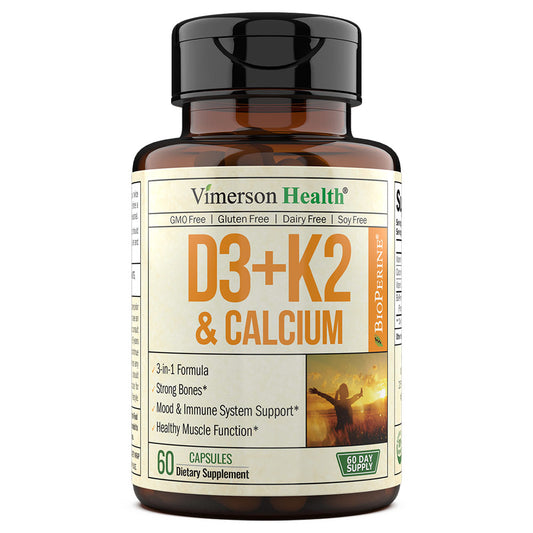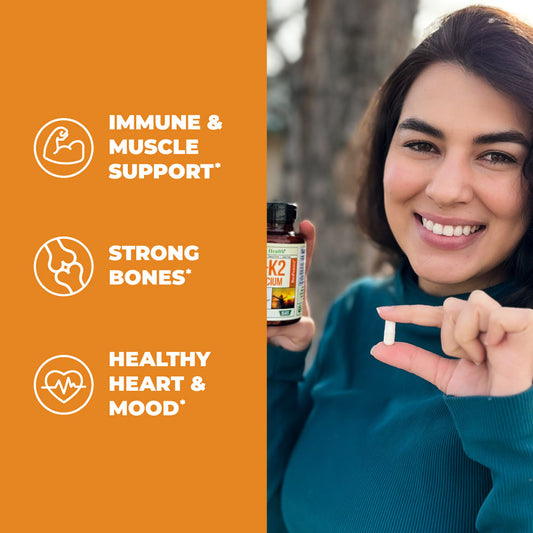
THE SUNSHINE VITAMIN
VITAMIN D3 - USES, PROVEN HEALTH BENEFITS, SIDE EFFECTS AND ALL THE INFORMATION YOU NEED
-
MULTIVITAMIN FOR MEN SUPPLEMENT
Vendor:Vimerson HealthRegular price $21.97Regular priceUnit price / per -
MULTIVITAMIN FOR WOMEN SUPPLEMENT
Vendor:Vimerson HealthRegular price $21.97Regular priceUnit price / per -
NOOTROPIC BRAIN BOOSTER SUPPLEMENT
Vendor:Vimerson HealthRegular price $23.97Regular priceUnit price / per -
GLUCOSAMINE + VITAMIN D3 SUPPLEMENT
Vendor:Vimerson HealthRegular price $26.97Regular priceUnit price / per -
D3 + K2 & CALCIUM SUPPLEMENT
Vendor:Vimerson HealthRegular price $23.97Regular priceUnit price / per -
HAIR, SKIN & NAILS SUPPLEMENT
Vendor:Vimerson HealthRegular price $22.97Regular priceUnit price / per
WHAT IS VITAMIN D3?
Vitamin D3, scientifically known as cholecalciferol, is a vital fat-soluble vitamin that belongs to the secosteroid family. Remarkably, our bodies can produce Vitamin D3 when exposed to sunlight. Specifically, it is synthesized in the skin in response to ultraviolet B (UVB) rays from the sun.

WHY THE SUNSHINE VITAMIN?
Vitamin D3 is often referred to as "the sunshine vitamin" because your body can produce it when your skin is exposed to sunlight. However, depending solely on sunlight may not provide you with sufficient Vit D3. That's where supplementation comes into play, ensuring you enjoy all the benefits it offers.
BEST NATURAL SOURCES OF VITAMIN D3
-

1. SUNLIGHT: THE PRIMARY SOURCE
The most natural and abundant source of Vitamin D3 is sunlight. When your skin is exposed to ultraviolet B (UVB) rays from the sun, it synthesizes Vitamin D3. It's often called the "sunshine vitamin" for this reason. Spending time outdoors and allowing sunlight to reach your skin can help maintain healthy Vitamin D3 levels. However, factors like geographical location, time of day, skin tone, and sunscreen use can affect this process. In regions with limited sunlight, especially during the winter months, obtaining enough Vitamin D3 from sunlight alone can be challenging.
-

2. DIETARY SOURCES OF VITAMIN D3
While not abundant in most foods, some dietary sources of Vitamin D3 exist. Fatty fish like salmon, mackerel, and trout are among the best natural sources. Egg yolks, cheese, and beef liver also contain small amounts of Vitamin D3. However, it can be challenging to meet your daily Vitamin D3 requirements through diet alone, particularly if you have dietary restrictions or preferences. As a result, many people turn to supplements to bridge the gap.
SUPPLEMENTATION: ENSURING ADEQUATE VITAMIN D3 INTAKE
The recommended daily intake of Vitamin D3 can vary based on factors such as age, gender, and life stage. However, a general guideline suggests that most adults should aim for 600-800 international units (IU) per day.* This guideline can serve as a starting point, but it's essential to consult with a healthcare provider to determine the appropriate dosage for your specific needs. Factors such as your current Vitamin D3 levels, dietary habits, and exposure to sunlight will influence your required intake.
HEALTH BENEFITS OF VITAMIN D3
-
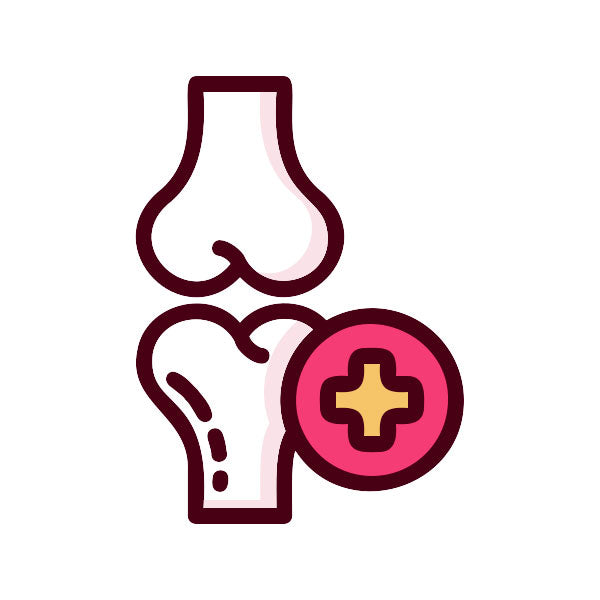
1. BENEFIT FOR VITAMIN D3: STRONGER BONES
Undoubtedly, one of the most recognized benefits of Vitamin D3 is its role in ensuring optimal bone health.* It achieves this by enhancing the absorption of essential minerals, such as calcium and phosphorus, in the intestines.* These minerals are crucial for building and maintaining robust bones.* Consequently, a deficiency in Vitamin D3 can lead to weakened bones and an elevated risk of fractures.*
-

2. BENEFITS FOR TAKING VITAMIN D: IMMUNE SYSTEM SUPPORT
A robust immune system is your body's first line of defense against various health challenges.* Vitamin D3 plays a pivotal role in enhancing your immune resilience, helping you stay strong and well.* It empowers your body to face everyday health hurdles with greater vigor.* With its positive influence on immune resilience, Vitamin D3 contributes to overall optimized wellness, promoting vitality and a sense of well-being in your daily life.*
-

3. VITAMIN D3 AND MOOD ENHANCEMENT
Several investigations have unveiled the potential connection between Vitamin D3 and mood regulation.* While the precise mechanisms remain a subject of ongoing research, evidence indicates that optimal Vitamin D3 levels may mitigate symptoms of stress and contribute to overall emotional well-being.*
-

4. FERTILITY AND REPRODUCTIVE HEALTH: VITAMIN D BENEFITS FOR MEN AND WOMEN
Both men and women rely on adequate Vitamin D3 levels to support their reproductive health.* In women, Vitamin D3 plays a role in maintaining hormonal balance and optimizing the menstrual cycle, which can enhance fertility.* For men, this essential vitamin is associated with improved sperm quality and motility, potentially increasing the chances of successful conception.*
-
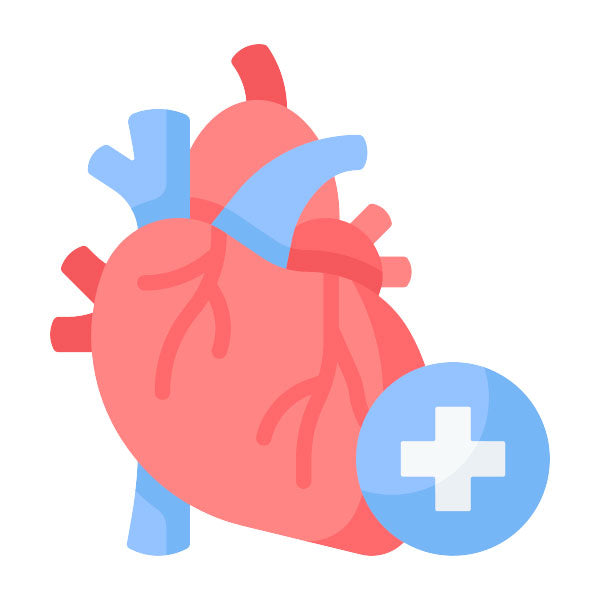
5. CARDIOVASCULAR HEALTH: SUPPORTING A HEALTHY HEART
Maintaining optimal Vitamin D3 levels is closely linked to heart health.* Research suggests that Vitamin D3 may help regulate blood pressure and contribute to overall cardiovascular well-being.* Adequate Vitamin D3 intake is essential for supporting a healthy heart and promoting a robust circulatory system.* By incorporating Vitamin D3 into your daily routine, you're taking a proactive step towards cardiovascular wellness and overall vitality.*
SYMPTOMS OF VITAMIN D3 DEFICIENCY
Being aware of the signs that may indicate insufficient levels of Vitamin D3 is essential for maintaining your overall well-being.* Common indicators of inadequate Vitamin D3 levels encompass feelings of tiredness, muscle weakness, discomfort in bones, and susceptibility to various health challenges.* Addressing these symptoms proactively is crucial to support your long-term health.* In cases of prolonged insufficiency, more severe consequences may arise, emphasizing the importance of regularly assessing your Vitamin D3 status.* Consult with your healthcare provider to explore the possibility of monitoring your Vitamin D3 levels through appropriate means.
THE SYNERGY OF VITAMIN D3 WITH OTHER NUTRIENTS
-
VITAMIN D AND CALCIUM
Vitamin D3 plays a crucial role in calcium absorption, a vital mineral for bone health and strength. When Vitamin D3 levels are adequate, it enhances the intestine's ability to absorb calcium from the diet.* This synergistic relationship is essential for maintaining strong bones, particularly in older adults.* Without sufficient Vitamin D3, even a diet high in calcium won't be fully effective, as the body struggles to absorb this crucial mineral.* Therefore, ensuring adequate levels of both Vitamin D3 and calcium is key to maintaining bone health and preventing bone-related issues.*
-
VITAMIN D3 AND MAGNESIUM
Magnesium is another important player in the effectiveness of Vitamin D3. It acts as a co-factor in the body's metabolism of Vitamin D, helping convert it into its active form.* This means that without enough magnesium, Vitamin D3, whether obtained from the sun, food, or supplements, cannot be effectively utilized by the body.* Furthermore, magnesium aids in the activation of vitamin D's enzymes, enhancing its benefits.* This interplay is crucial because a deficiency in magnesium can lead to lower levels of circulating Vitamin D in the body, negating the benefits of Vitamin D3 supplementation or sun exposure.*
-
VITAMIN D3 AND K2
Vitamin K2 works in tandem with Vitamin D3 in a way that is vital for bone and cardiovascular health.* While Vitamin D3 facilitates the absorption of calcium, Vitamin K2 helps direct this calcium to the bones and teeth where it is needed, preventing its deposition in the arteries and soft tissues.* This synergistic action is crucial for maintaining bone density and promoting cardiovascular health.* By taking Vitamin D3 and K2 together, you can maximize bone strengthening benefits while also supporting heart health, making their combination a key consideration in supplement regimens.*
-
HMB AND VITAMIN D
HMB (beta-hydroxy-beta-methylbutyrate) is a supplement that, when combined with Vitamin D3, may support muscle health.* This combination can be particularly beneficial for individuals looking to enhance their physical performance.* It's worth noting that athletes and fitness enthusiasts often incorporate HMB and Vitamin D3 into their training regimens to promote muscle recovery and endurance, helping them reach their performance goals more effectively.*

HOW TO GET TESTED FOR VITAMIN D LEVELS
Testing your vitamin D levels is a straightforward process and can provide valuable insights into your health. A blood test, known as a 25-hydroxyvitamin D test, is commonly used to measure vitamin D levels in the body. Depending on the results, your healthcare provider can recommend appropriate steps to address any deficiencies and optimize your vitamin D intake.
VITAMIN D3 FOR DIFFERENT AGE GROUPS AND POPULATIONS
-

INFANTS
The requirements for Vitamin D3 vary widely among different age groups and populations, playing a key role in various stages of life. For infants, Vitamin D3 is essential for the healthy development of bones and teeth.* It's especially important for breastfed infants to receive an adequate amount of this nutrient, as breast milk alone may not fulfill their Vitamin D3 needs.*
-

CHILDREN AND ADULTS
As children grow into adolescence, Vitamin D3 continues to be crucial.* This period involves rapid physical development, where Vitamin D3 supports the formation of strong bones and general growth.* For adults, Vitamin D3 remains important for maintaining bone strength and supporting muscle function.*
-

OLDER ADULTS
Older adults particularly benefit from adequate Vitamin D3, as their lifestyle and bodily changes can reduce the natural synthesis of this vitamin.* This age group often spends less time outdoors, and their skin's ability to synthesize Vitamin D3 decreases, necessitating a focus on ensuring sufficient levels.*
-

OTHER ASPECTS
Furthermore, Vitamin D3 needs can vary based on individual factors. People with darker skin tones, those residing in regions with limited sunlight, and individuals with higher body weights might have unique requirements for Vitamin D3.* It's advisable for these groups to seek personalized guidance to meet their specific needs for Vitamin D3.* This approach ensures that everyone, regardless of their age or background, can maintain optimal well-being with an appropriate level of this vital nutrient.*
CHOLECALCIFEROL: THE NATURAL FORM OF VITAMIN D3
Cholecalciferol, often found in vitamin D3 supplements, is the naturally occurring form of this nutrient.* Its primary role is to facilitate the absorption of calcium and phosphorus, essential for maintaining strong bones and teeth.* It's known for its superior absorption and effectiveness in raising vitamin D levels in the body.*

VITAMIN D3 TABLETS AND PILLS: WHAT YOU SHOULD KNOW
Vitamin D3 supplements come in various forms, including tablets and pills. Choose a form that suits your preferences and is easy to incorporate into your daily routine. Be sure to follow the recommended dosage instructions.
BEST VITAMIN D3 AND K2 SUPPLEMENT 🥇
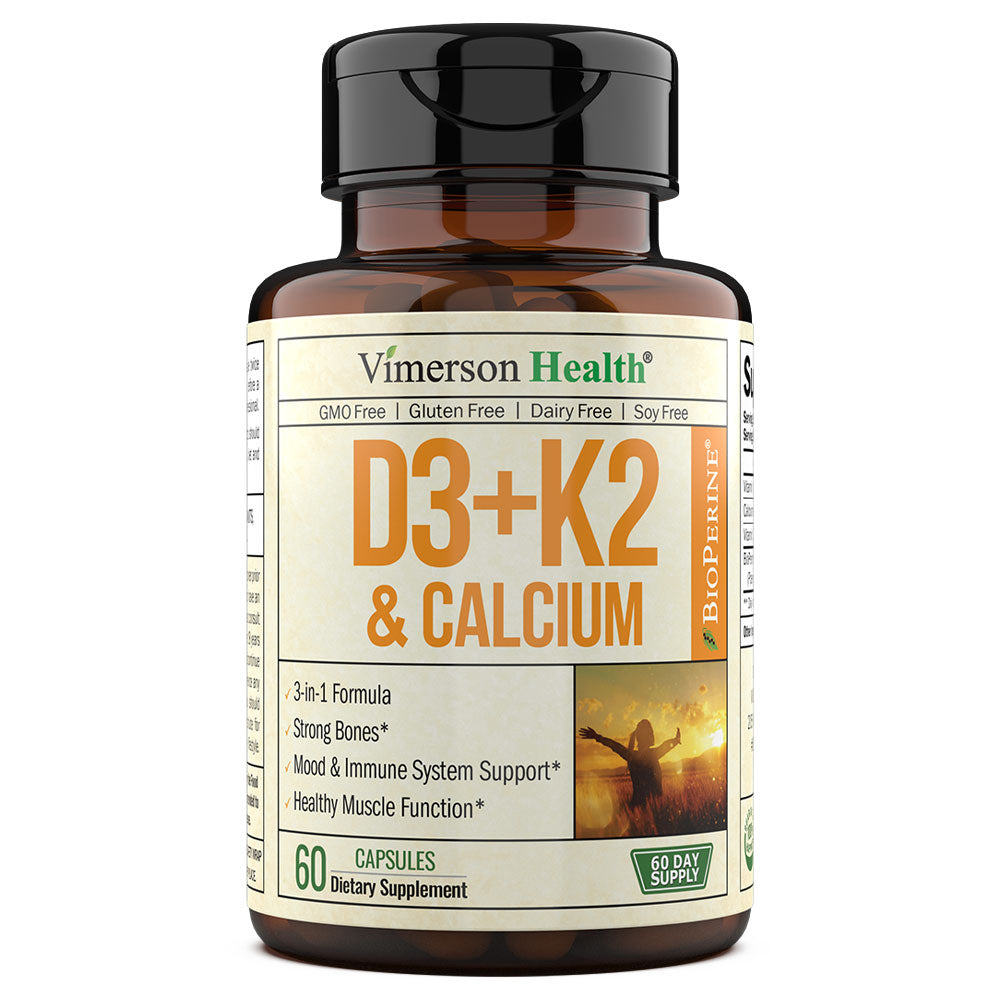
Vimerson Health
D3 + K2 & CALCIUM SUPPLEMENT
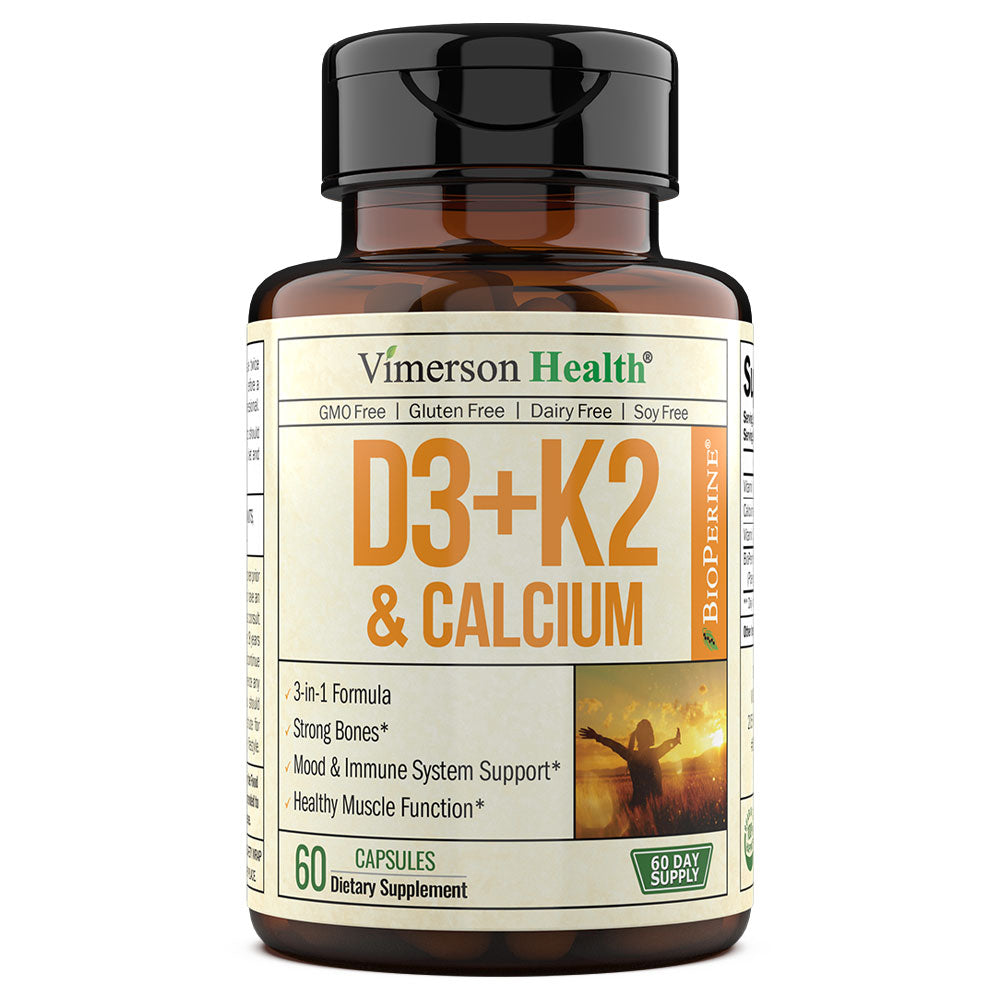
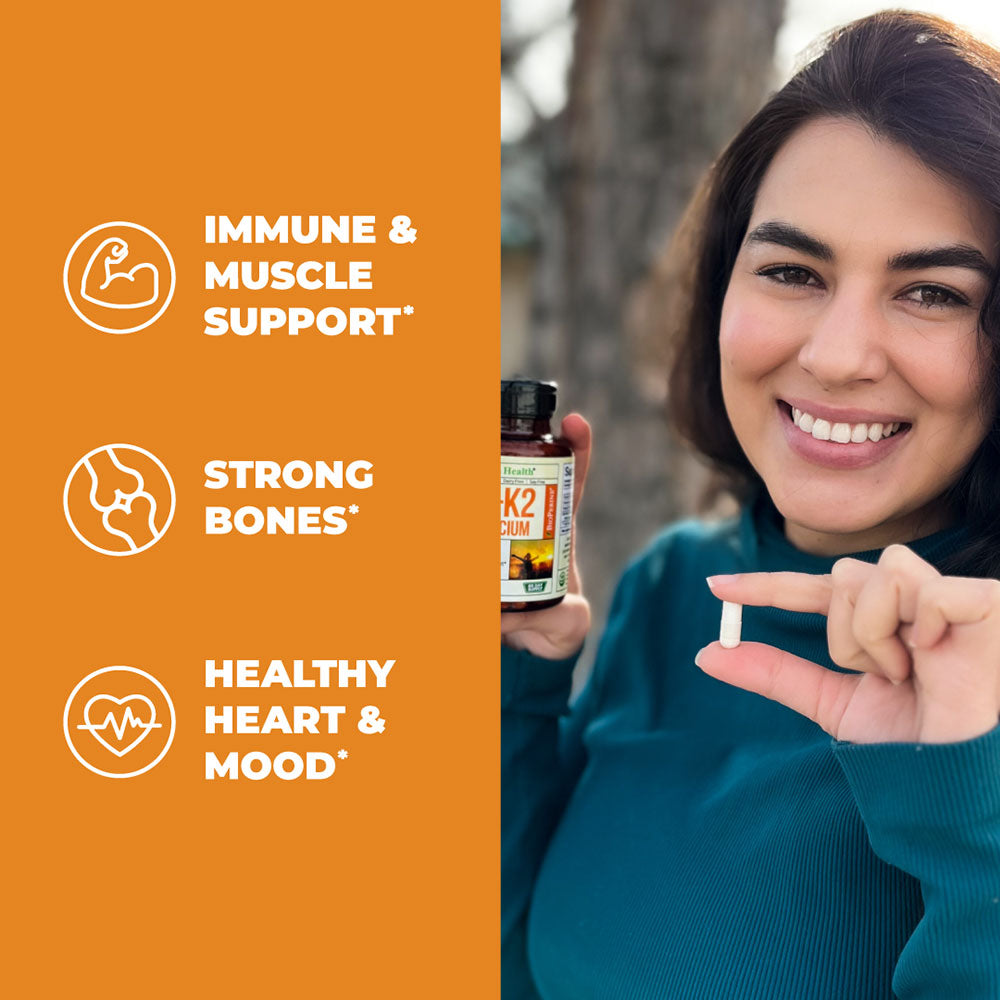

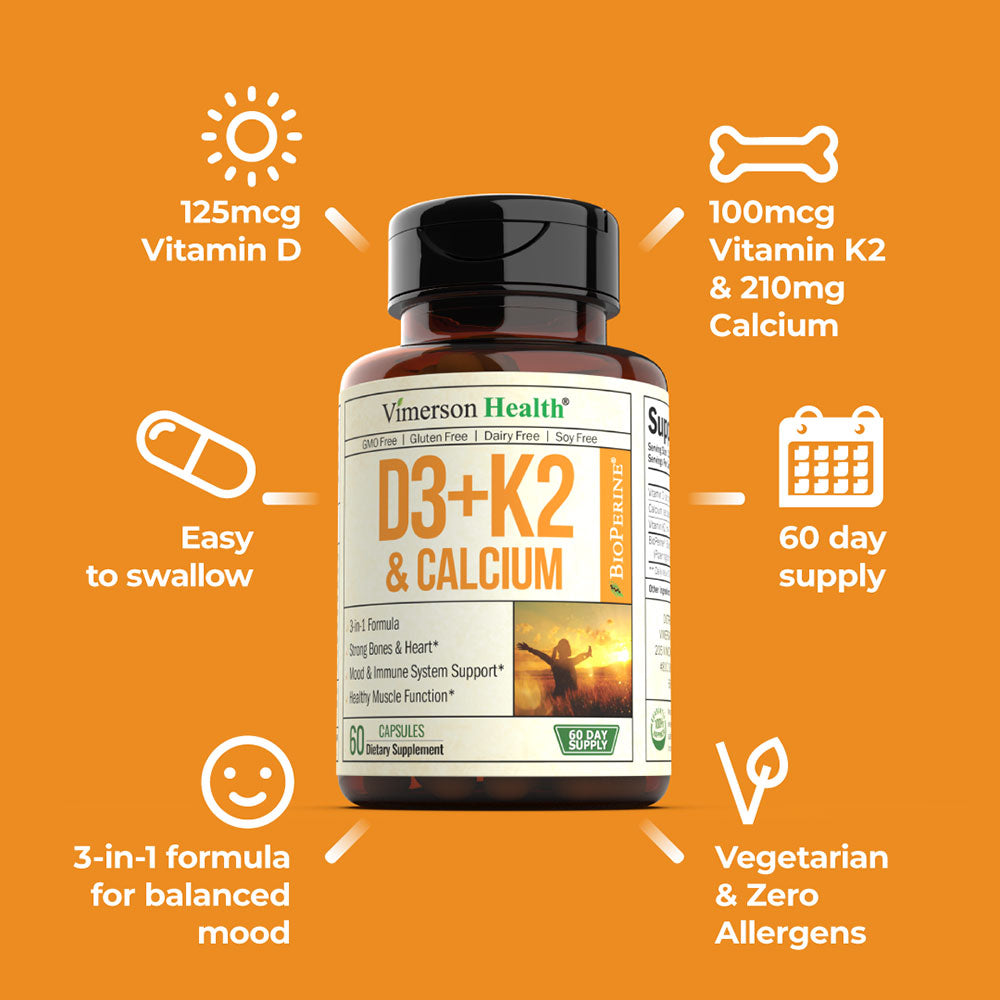

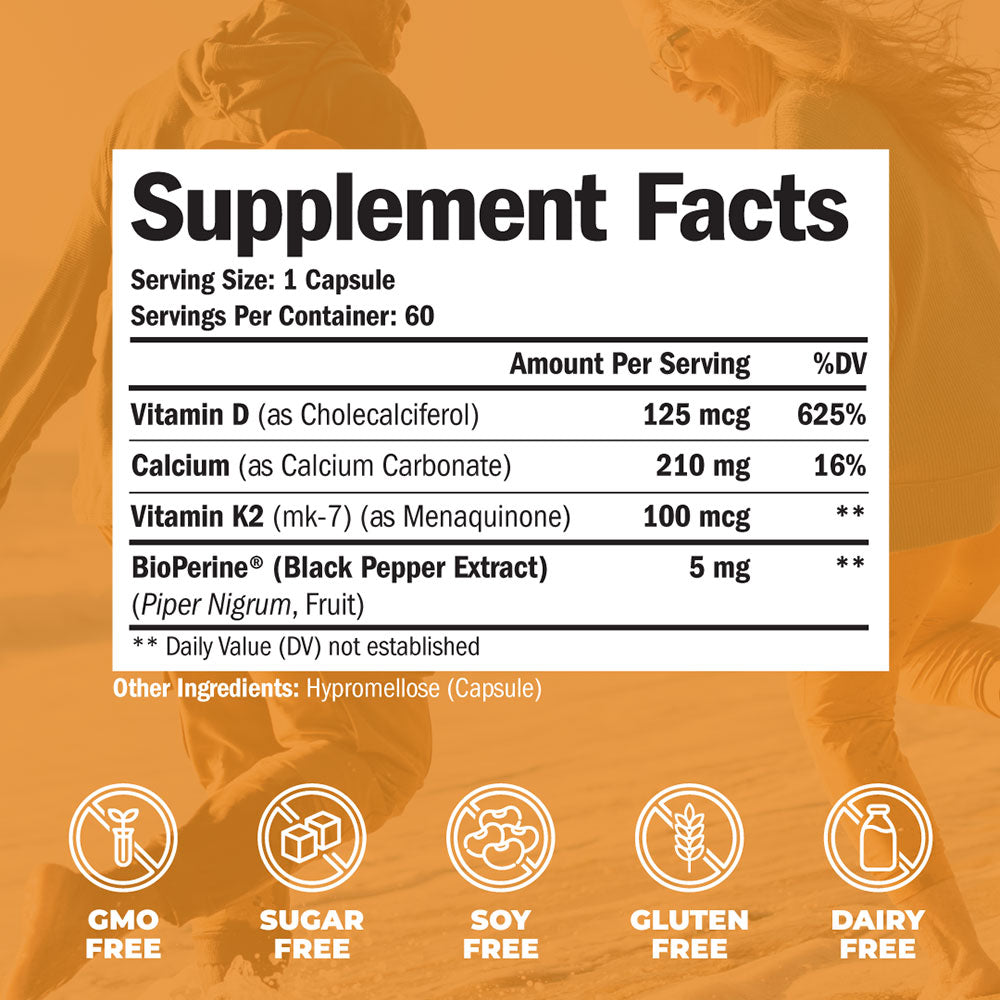
ℹ︎ FREQUENTLY ASKED QUESTIONS ABOUT VITAMIN D3
WHAT VITAMIN D3 IS GOOD FOR?
Vitamin D3, also known as cholecalciferol, is essential for several bodily functions.* It's crucial for the absorption and regulation of calcium and phosphorus, playing a significant role in maintaining bone and muscle health.* Adequate levels of Vitamin D3 support immune system function and might influence mood regulation.* It's naturally obtained through sunlight exposure and can be supplemented through diet or vitamin D3 supplements, especially in regions with limited sun exposure.*
IS IT OK TO TAKE VITAMIN D3 EVERYDAY?
Taking Vitamin D3 daily is generally considered safe and beneficial, especially for individuals with limited sun exposure or dietary intake of Vitamin D.* The recommended dosage for Vitamin D3 varies based on individual needs, age, and existing Vitamin D levels.* It's important to maintain Vitamin D3 within normal levels, as excessive intake can lead to adverse effects.* Regular monitoring and consulting healthcare guidelines for optimal dosing is advisable.*
WHO NEEDS TO TAKE VITAMIN D3?
Individuals who may benefit from Vitamin D3 supplements include those with limited sun exposure, older adults, people with darker skin (as melanin reduces skin's ability to produce Vitamin D from sunlight), and individuals on vegan or vegetarian diets that lack natural dietary sources of Vitamin D.* Also, those living in higher latitudes or areas with long winters may require supplementation due to reduced sunlight.* Regular monitoring of Vitamin D levels can help determine the need for supplementation.*
WHAT'S THE DIFFERENCE BETWEEN VITAMIN D AND D3?
Vitamin D is a broad term referring to a group of fat-soluble secosteroids responsible for increasing intestinal absorption of calcium, magnesium, and phosphate.* Among these, Vitamin D3, also known as cholecalciferol, is naturally synthesized in the skin through exposure to sunlight.* D3 is more effective at raising and maintaining overall Vitamin D levels in the body compared to other forms like Vitamin D2 (ergocalciferol), typically found in plant-based sources.*
SHOULD I TAKE VITAMIN D3 MORNING OR NIGHT?
Taking Vitamin D3 in the morning is generally recommended. This is because Vitamin D3, being a fat-soluble vitamin, may interfere with sleep if taken at night.* Morning doses align better with the body's natural daytime processing of sunlight into Vitamin D.* Additionally, it's best to take it with a meal containing fat for optimal absorption, as this enhances its bioavailability.*
HOW LONG SHOULD I USE VITAMIN D3?
The duration of Vitamin D3 supplementation varies based on individual needs and baseline vitamin D levels.* Generally, it's taken long-term to maintain optimal vitamin D status, especially in people with limited sun exposure.* A healthcare provider can provide guidance on the appropriate duration, often based on periodic blood tests to monitor vitamin D levels.* Consistency and adherence to the recommended dosage are key for effective results.*
WHAT ARE THE SYMPTOMS OF A VITAMIN D3 DEFICIENCY?
Symptoms of Vitamin D3 deficiency can be subtle or non-specific, making it challenging to diagnose based solely on symptoms. Common signs include fatigue, bone discomfort, muscle weakness or cramps, mood changes, and an overall feeling of not being well.* In more severe cases, it can lead to bone softening or fragility.* It's important to monitor these symptoms, especially in individuals with limited sun exposure or dietary intake of Vitamin D3.*
HOW SOON WILL I FEEL BETTER AFTER TAKING VITAMIN D3?
The time it takes to feel better after starting Vitamin D3 supplementation can vary based on individual factors like the level of deficiency and overall health.* Generally, some individuals may start noticing improvements in symptoms like fatigue and general well-being within a few weeks of consistent supplementation.* However, it's important to maintain regular intake as directed and understand that some benefits, particularly those related to bone health, may take longer to manifest.*
WHAT IS THE SAFEST AMOUNT OF VITAMIN D3 TO TAKE DAILY?
The safest amount of Vitamin D3 to take daily varies based on individual needs, but generally, for most adults, a dose of 600-800 IU (15-20 micrograms) per day is often recommended.* However, some individuals may require higher doses, especially if they have lower blood levels.* The upper safe limit is typically considered to be 4000 IU (100 micrograms) per day.* It's important to tailor the dosage to individual health needs and consider factors like sun exposure, dietary intake, and specific health conditions.*
WHAT IS THE MAXIMUM VITAMIN D3 PER WEEK?
The maximum safe dosage of Vitamin D3 per week can vary, but a common upper limit is around 10,000 IU (250 micrograms) per week.* This dosage is generally considered safe for most adults, though individual needs may vary.* It's important to note that exceeding this amount without medical supervision could lead to adverse effects. The appropriate dosage can depend on factors like individual health status, sun exposure, and dietary intake. Regular monitoring of blood levels is advisable when taking higher doses.
* These statements have not been evaluated by the Food and Drug Administration. This product is not intended to diagnose, treat, cure, or prevent any disease.


